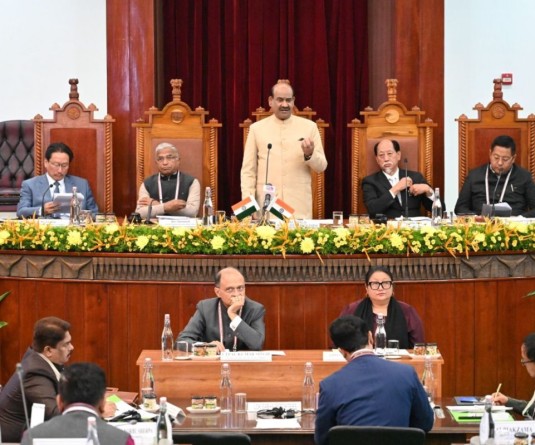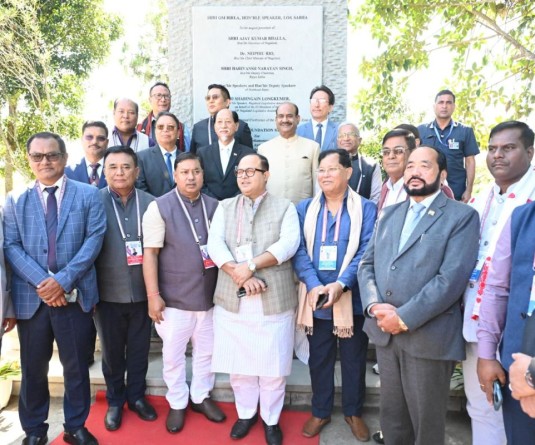
‘The dynamics have changed but the problems in Naga society still remain the same’
Morung Express
News Kohima | August 2
The issues and challenges that Naga society faced 39 years ago still remains the same today, viewed Neingulo Krome, Secretary General of the Naga Peoples' Movement for Human Rights (NPMHR) speaking at the 39th Foundation Day of the All Nagaland College Students’ Union (ANCSU) on August 2 at Ura Academy Hall, Kohima.
The celebration was held alongside the felicitation of Degree toppers with Kuholi Chishi, Director, Higher Education as the special guest. Krome who is also the founding member of ANSCU shared insights on the formation of the ANCSU which was formed in 1979 to strengthen the Naga Students' Federation and to address social challenges in Naga society alongside students' welfare.
In 1979, Nagaland had only seven colleges but today it has 63 colleges. A major challenge in Naga society back then, according to Krome, was the ILP issue and influx of outsiders. This was an immediate concern of ANCSU during its formative years where efforts were made and memorandums written for the intervention of the government to take corrective measures. ANCSU organised several initiatives for college students to learn the value of dignity of labour, and to take up menial job. Despite those efforts, the government failed to take up effective measures.
"Today we are overwhelmed with the influx of illegal immigrants. The problem then was very small, but the problem now is the same but the dimensions have changed. 39 years ago we tried to address this problem and we failed, now how are we going to address this problem?" remarked Krome.
Krome also stated that Naga society is cursed by the feeling of tribalism which is not a recent trend. It was present back then but the problem has amplified today, viewed Krome mentioning that the ANCSU tried to allay growing feelings of tribalism in the college level. Witnessing these consistent problems in Naga society, Krome noted that unless there is personal change within each individual these problems will continue to multiply.
"The dynamics have changed but the problem still remains the same," remarked Krome. "Today the Naga problem is not so much of Indians, Chinese or Burmese but because of Nagas ourselves. That is something we must understand," asserted Krome citing the idea of development in recent years where the government has introduced developments which are causing more harm in Naga society. "Back then we were conscious of what kind of development should come to Nagaland. In 1981, when the Nagaland government proposed the Railway line in Zubza, ANCSU was the first to protest and written to the Chief Minister. But now after 39 years the present government has again proposed the railtrack from Dimapur to Zubza and land owners are happily taking the compensation money. Not a single Naga organisation have voiced concern on this," pointed out Krome who referred the developmental ideas introduced by the government as 'Development aggression' meaning development measures that violates human rights.
Krome further sought forgiveness on behalf of the older generation for failing the present generation.
Naga society has faced trials and tribulations for 70 years trying to find a future for the Nagas. We have been able to stop the Indian government from exploiting our resources; will the younger generation be courageous enough to stop them? Today or tomorrow, anytime the Government of India may surprise us by signing some agreement. Some people will try to stop you; some people will try to influence you. Some will oppose the agreement while some will support. Don’t listen to them, listen to your conscience, listen to your heart," concluded Krome.
Speaking on the past years of her student years and years of activism, Chishi stated that education system was just taking off then and students had struggled to attain education. However in recent years, Chishi noted that students are not willing to make sacrifices or to move out of their comfort zone to serve other communities. "You are not willing to serve in a land that does not belong to you," stated Chishi sharing her experiences of working outside her comfort zone for 24 years has been a 'blessing' and enriching experience.
"We learn so much from other communities. In developing others, we also develop ourselves. Learn to go out. Scatter and work wherever you are assigned and wherever there is an opening," said Chishi. The importance of coexisting together and deriving strength from unity was also emphasised.
Encouraging the students to develop holistically and to enhance qualitative growth, Chishi noted that one should not be satisfied with just a component of achievement. "While excelling in academia, it is important to develop one’s personality and character. Do not be satisfied with just one component of your achievement. Do not neglect the smaller details of your life. Blessed are those people who takes the small steps differently," stated Chishi. In conclusion, Chishi motivated the students that experiencing struggles and humiliations are essential. "Those trying moments sharpens you. You become braver, you develop your personality and abilities," remarked Chishi.






